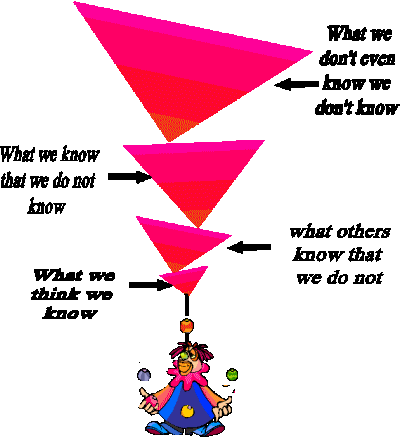|
If your seminary experience
really "works",
you will somehow arrive at
an acute sense
of how much
you really don't know and how deeply you are loved,
anyway!
If you finish seminary, and
think that you have
"the answers" and are loved because you have "the
answers" ,
then you've spent your time
dealing with
misguided questions.
At its best, seminary
acts as the beginning of a life of humility, that means, among other
things, learning to not take yourself or what you think you know,
for granted. It means spending lots of time with the Risen Jesus,
wherever you find him. It means discovering a few clues as to some
of the meanings of Incarnation.
At its best, seminary
provides
opportunities for people to sort out the meanings of their experience
of God and of the Risen Jesus. Seminary takes on the character of
the Jesus' time in the Wilderness after his baptism or of Paul's
time in Arabia after his Damascus Road experience.
It is sad when seminary
imitates the surrounding culture instead of the Kingdom of God;
when it allows itself to become a place, a closed process, a finite
time; when it allows itself
to become a competitive, "win-lose" environment that teaches
more about getting answers right and about humiliation for getting
other than expected answers than about humility; when it shows so
little understanding of Jesus'
parable of the laborers (see Matthew 20:1-16).
It is sad when seminary
knows so little about
self-transcending love and discipleship as "being.".
It is sad when seminary
becomes what is often described as a "left-brained" experience
(primarily reason and logic oriented), and neglects "the right
brain" (feeling and spirit oriented).
It is sad when seminary
becomes less than intensive, intentional life as disciples together
with the Risen Jesus.
|
|
 |
We tend to forget that while "Truth" may well
be absolute and remain constant (Plato and Socrates may have been
onto something with their views of the Ideal and Truth), our very
human knowledge of "Truth" is relative and changes constantly
in both quantity and quality.
Much depends upon how we look at things, on our perspective,
on the many facets of context, and on the way we "frame"
what we think we know.
In a real sense, we constantly juggle our lives
and what we know.
We keep ourselves in a place from which we
cannot see much because we focus on
our juggling and on what we think we know.
The challenge is to stop the juggling,
to simplify our lives at least somewhat,
and to get past what we think we know
to where God is,
both in us and around us.
|
|
|
|
|
We humans beings are such that
we are often afflicted with what psychologists call
"cognitive dissonance".
It has to do with thinking,
believing, valuing in one way,
but behaving in ways
that do not coincide
with how we think, believe or value.
In other words, the way we live gets
out of "sync" with what
our heads and hearts say is true.
This human condition is described
so very well in
The Letter to the Romans,
chapter 7.
We are too often the worst combination of cherub
and Frankenstein's monster. On one hand, there is
something of God in us, something transcendent and something divine.
On the other hand, we are cobbled together,
in what, superficially,
appears to be
a rather slipshod fashion
(especially in how we think and feel),
and we reek havoc on ourselves,
others, and the One who formed us.
Our situation is at its worst
when the cherub and the monster
each kid themselves the the other
doesn't exist.
Then, we lie to ourselves;
then we lie to those around us.
Being disciples together with the Risen Jesus
means, among other things,
embracing a compassiate, radical honesty
in dealing with oneself and with others.
It is a healing honesty;
it is not honesty used as a weapon
against oneself or against others.
It is an honesty that seeks
consistency between thought, feeling,
word and action;
it has nothing to do with the sort of
consistency that is
"the hob goblin of little minds."
|
|
|
|
|